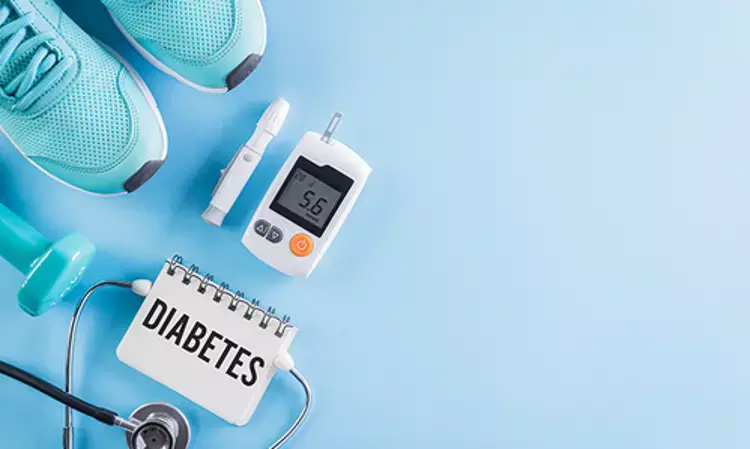- Home
- Medical news & Guidelines
- Anesthesiology
- Cardiology and CTVS
- Critical Care
- Dentistry
- Dermatology
- Diabetes and Endocrinology
- ENT
- Gastroenterology
- Medicine
- Nephrology
- Neurology
- Obstretics-Gynaecology
- Oncology
- Ophthalmology
- Orthopaedics
- Pediatrics-Neonatology
- Psychiatry
- Pulmonology
- Radiology
- Surgery
- Urology
- Laboratory Medicine
- Diet
- Nursing
- Paramedical
- Physiotherapy
- Health news
- Fact Check
- Bone Health Fact Check
- Brain Health Fact Check
- Cancer Related Fact Check
- Child Care Fact Check
- Dental and oral health fact check
- Diabetes and metabolic health fact check
- Diet and Nutrition Fact Check
- Eye and ENT Care Fact Check
- Fitness fact check
- Gut health fact check
- Heart health fact check
- Kidney health fact check
- Medical education fact check
- Men's health fact check
- Respiratory fact check
- Skin and hair care fact check
- Vaccine and Immunization fact check
- Women's health fact check
- AYUSH
- State News
- Andaman and Nicobar Islands
- Andhra Pradesh
- Arunachal Pradesh
- Assam
- Bihar
- Chandigarh
- Chattisgarh
- Dadra and Nagar Haveli
- Daman and Diu
- Delhi
- Goa
- Gujarat
- Haryana
- Himachal Pradesh
- Jammu & Kashmir
- Jharkhand
- Karnataka
- Kerala
- Ladakh
- Lakshadweep
- Madhya Pradesh
- Maharashtra
- Manipur
- Meghalaya
- Mizoram
- Nagaland
- Odisha
- Puducherry
- Punjab
- Rajasthan
- Sikkim
- Tamil Nadu
- Telangana
- Tripura
- Uttar Pradesh
- Uttrakhand
- West Bengal
- Medical Education
- Industry
Lonely adults may have a higher risk of diabetes, suggests study

Socially isolated older adults are at increased risk of developing diabetes and high blood sugar, according to a study being presented Sunday at ENDO 2025, the Endocrine Society’s annual meeting in San Francisco, Calif.
“Social isolation and loneliness have been increasingly recognized as important health risk factors after the COVID-19 pandemic. Our findings underscore the importance for clinicians to recognize social isolation as a critical social determinant of health when caring for older patients,” said lead researcher Samiya Khan, M.D., of the Keck School of Medicine at the University of Southern California in Los Angeles, Calif. “These findings are especially relevant given the rapidly growing aging population in the United States and globally, alongside the widespread prevalence of social isolation and loneliness among older adults.”
Khan noted that while a few previous studies have explored the connection between social isolation and diabetes, this study is among the first to examine its link to poor glycemic control using a nationally representative sample-data that reflects the broader U.S. population. This makes the findings applicable on a national scale.
Khan and her team analyzed data from the National Health and Nutrition Examination Survey (NHANES) from 2003-2008. NHANES is a comprehensive survey program designed to assess the health and nutritional status of adults and children in the U.S.
The researchers studied data from 3,833 adults aged 60 to 84, representing about 38 million older people in the U.S. After adjusting for other factors, they found that socially isolated older adults were 34% more likely to have diabetes and 75% more likely to have poor blood sugar control than those who were not isolated. This suggests that social isolation may be an important but often overlooked risk factor for diabetes and poor blood sugar management in older adults.
“These findings underscore the importance of social connections for the wellbeing of older adults,” Khan said. “Physicians should recognize social isolation as a potential risk factor among elderly patients for both diabetes and high blood sugar.”
Reference:
Lonely adults may have a higher risk of diabetes, The Endocrine Society, Meeting: ENDO 2025.
Dr Kamal Kant Kohli-MBBS, DTCD- a chest specialist with more than 30 years of practice and a flair for writing clinical articles, Dr Kamal Kant Kohli joined Medical Dialogues as a Chief Editor of Medical News. Besides writing articles, as an editor, he proofreads and verifies all the medical content published on Medical Dialogues including those coming from journals, studies,medical conferences,guidelines etc. Email: drkohli@medicaldialogues.in. Contact no. 011-43720751


